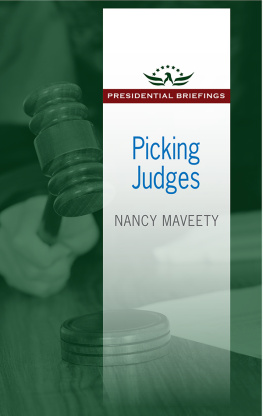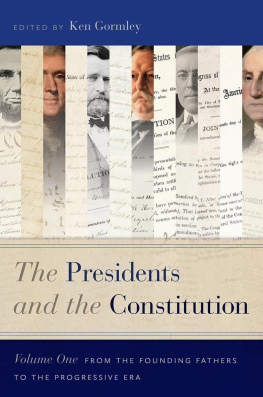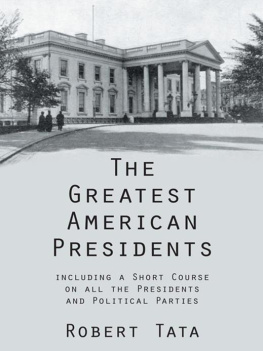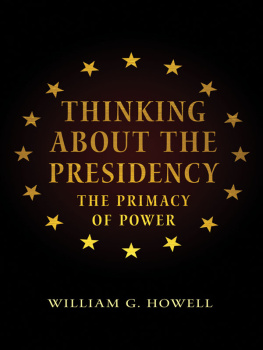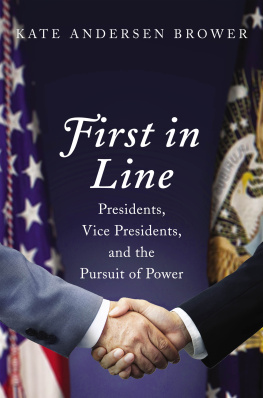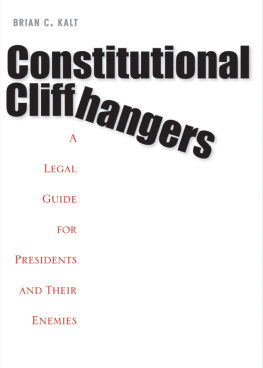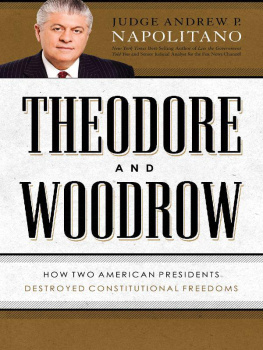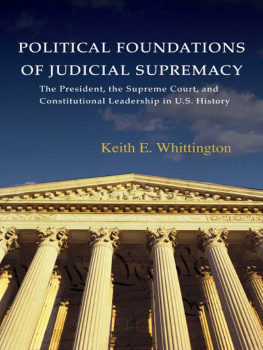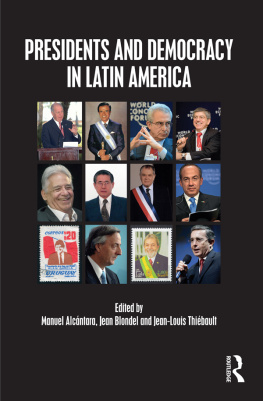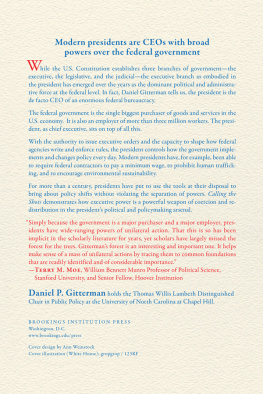Picking
Judges
The Presidential Briefings Series
Robert J. Spitzer, Series Editor
The Presidential Briefings Series provides concise and readable introductions to topics of concern to those who have been and will be President of the United States. By approaching their subjects from the vantage point of what a president most needs to know, and what the citizenry most need to know about the presidency, these books are authoritative and significant works on subjects related to the presidency.
Previously published and forthcoming works include:
Political Rhetoric by Mary E. Stuckey
Making Foreign Policy Decisions by Christopher J. Fettweis
Presidential Leadership in an Age of Change by Michael A. Genovese
Picking Judges by Nancy Maveety
PRESIDENTIAL BRIEFINGS
Picking
Judges
NANCY MAVEETY
First published 2016 by Transaction Publishers
Published 2017 by Routledge
2 Park Square, Milton Park, Abingdon, Oxon OX14 4RN
711 Third Avenue, New York, NY 10017, USA
Routledge is an imprint of the Taylor & Group, an informa business
Copyright 2016 by Taylor & Francis.
All rights reserved. No part of this book may be reprinted or reproduced or utilised in any form or by any electronic, mechanical, or other means, now known or hereafter invented, including photocopying and recording, or in any information storage or retrieval system, without permission in writing from the publishers.
Notice:
Product or corporate names may be trademarks or registered trademarks, and are used only for identification and explanation without intent to infringe.
Library of Congress Catalog Number: 2015043184
Library of Congress Cataloging-in-Publication Data
Names: Maveety, Nancy, author.
Title: Picking judges / Nancy Maveety.
Description: New Brunswick : Transaction Publishers, 2016.
Identifiers: LCCN 2015043184| ISBN 9781412862745 (hardcover) | ISBN 9781412863308 (pbk.)
Subjects: LCSH: Judges--Selection and appointment--United States.
Classification: LCC KF8776 .M337 2016 | DDC 347.73/2034--dc23
LC record available at http://lccn.loc.gov/2015043184
ISBN-13: 978-1-4128-6274-5 (hbk)
ISBN-13: 978-1-4128-6330-8 (pbk)
In memory of my colleague and my old friend, Tom Langston
Contents
This short volume, styled as a presidential briefing book, attempts to convince the reluctant or the misinformed that a president can and must pack the courts. In exercising the executives Article II power to nominate federal judicial candidates for confirmation by the Senate, a president has the opportunity to leave a policy legacy that far outlasts the tenure of his or her administration. But legacies do not come cheap, and to make successful appointments, a president must husband as well as spend political resources, assess and set both short- and long-term goals, and attend to the legislative environment and federal bench situation with which he or she is faced.
While some presidential advisors might counsel against wasting political capital on a minimally significant part of the presidential agenda, this briefing book explains how and why such advice should be taken with a grain of salt. Beginning with a chapter that reviews the historical evolution and development of the presidents Article II appointment power with respect to the federal courts, the discussion then turns to a description of the key transformational events and moments that serve as historical and systemic milepostsor teaching moments, for future chief executives and their staff. A second chapter builds on these lessons of history to examine the various qualities and qualifications that a president considers in his or her candidates for nomination to the federal bench. The correct mix of political, legal, professional, personal, and demographic characteristics not only reduces informational uncertainty about the future on-the-bench performance of prospective appointees, but also points to the relative political and electoral costs and payoffs that are the consequences of choosing particular kinds of nominees.
The third chapter is directed at the timorous and addresses assessing the politico-institutional context in which a president must work to secure the successful confirmation of his or her judicial candidates. Understanding this context and the factors within it allows a president to reduce the political uncertainty as to his or her nominees confirmation prospectsallowing the president to calculate when and when not to act boldly in filling vacancies on the federal bench, from the US Supreme Court to the courts of appeal to the federal district courts. A fourth chapter constructs a how to of ingredients and steps that a president can adapt to his or her particular circumstances and act upon in light of the lessons of Chapters 13. Specifically, the chapter recommends and details the twin processes of candidate screening and executive staffingwith carefully selected members of the latter engaging in the identifying of the former. Finally, a fifth chapter takes this briefing book to the why question and takes on the contrarian who still might need convincing as to the importance of the presidents judicial appointment efforts. It is here that the issue of presidential legacy is directly confronted, with a candid account of both the policy-oriented model of judging that is the contribution of contemporary political science and a frank acknowledgment that elections have consequences coming together to endorse presidential agency vis a vis the federal courts. A presidents active use of the scope of the powers of the office, including judicial appointment, ensures that law isand continues to beshaped by changing coalitions of policy interests.
Agency is legacy.
One
History
If history is any guide, it should be for the president, in selecting nominees to staff the federal judiciary. What a history of the constitutional origins and presidential utilization of the Article II appointment power teaches is that the formal, constitutional process is the baseline constraint from which presidents can operate to create opportunities, or foreclose them.
This chapter describes the historical evolution and development of the presidents Article II appointment power with respect to the federal judiciary, outlining the institutional dynamics of presidential nomination and senatorial advice and consent in confirmation. The constitutional framework is presented as the formal baseline from which and within which presidential discretion and leadership can operate. Mileposts, both historical and systemic, in the development of the formal dimensions of the judicial appointment power are briefly illuminated. That development, as we shall see, is a matter of not only the expansive utilization, but also the disadvantageous misuse, of optionsthose presented and those made.
The following transformational moments and events structure the discussion of mileposts in the exercise of judicial appointment power: (1) cardinal criteria of the early period, from the presidency of George Washington through that of Andrew Jackson: party loyalty and geography of appointees; (2) the Senate gets political: Andrew Johnson and the shrinking of the court; (3) the contentious confirmation of Louis Brandeis: organized political opposition meets presidential conceptions of merit in appointees; (4) Franklin Delano Roosevelt, the court-packing plan, and executive dominance of the court; (5) Richard Nixons appeal to the electorate: his campaign for strict constructionists; (6) ideology, interest group activism, and courting the media: the watershed that is the Robert Bork nomination; and (7) institutional conflict and the modern nuclear option: partisan polarization and its impact on the judicial appointment process.

